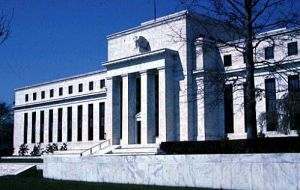MercoPress. South Atlantic News Agency
Federal Reserve more optimistic about outlook for the US economy
 The US central bank feels the economy is still vulnerable
The US central bank feels the economy is still vulnerable The Federal Reserve has a more optimistic outlook for the US economy, according to meeting minutes released Wednesday, but the central bank is still debating how to shrink its massive balance sheet.
The Fed now expects US GDP to increase at an annual rate of between 3.2% and 3.7% in 2010. That's up from the Fed's previous estimate of between 2.8% and 3.5% in January. GDP rose at a 3.2% annual rate in the first three months of this year, the government said last month.
At the same time, the Fed reduced its forecast for US unemployment rate to a range between 9.1% and 9.5% this year, versus 9.5% to 9.7% in January. The unemployment rate currently stands at 9.9%.
The minutes were from the Fed's most recent Open Market Committee meeting, which took place last month. That meeting happened before the financial markets were rocked by an escalation of fears about the economic crisis in Europe.
Still, Fed members also acknowledged the growing turmoil in Europe leading up to its last meeting, noting that “fiscal strains in Greece intensified during the inter-meeting period”. The Fed subsequently announced plans to expand currency swaps with the European Central Bank and other central banks in the region to help contain the crisis.
But in spite of the improved outlook, the Fed cautioned that the US economy remains vulnerable enough to maintain an “accommodative stance of monetary policy”.
In addition, committee members discussed ways to reduce the central bank's balance sheet, which swelled during the financial crisis as the Fed bought billions worth of government and corporate bonds.
In March, the Fed completed a 1.25 trillion USD ram to buy mortgage bonds backed by government-sponsored lenders. It also purchased about 175 billion USD of agency debt. Last year, the Fed bought 300 billion of long-term U.S. Treasury bonds to help keep mortgage rates down.
“Meeting participants agreed broadly on key objectives of a longer-run strategy for asset sales and redemptions” said the minutes. “Reducing the size of the balance sheet would decrease the associated reserve balances to amounts consistent with more normal operations of money markets and monetary policy.”
But the minutes showed that Fed bankers had a variety of opinions on how and when to begin selling the securities. Most members wanted to delay asset sales “for some time,” but a few members preferred to begin sales “relatively soon.”
A majority of members were in favour of selling assets gradually over a period of five years, but not until after the Fed begins increasing interest rates since that would mean the economic recovery is firmly established.




Top Comments
Disclaimer & comment rulesCommenting for this story is now closed.
If you have a Facebook account, become a fan and comment on our Facebook Page!